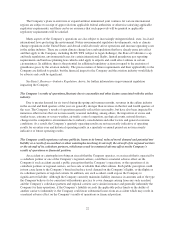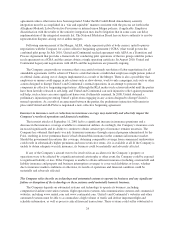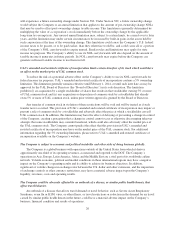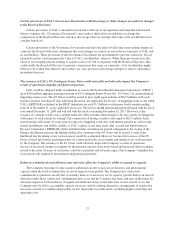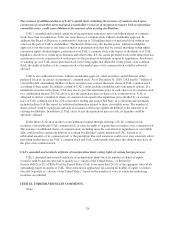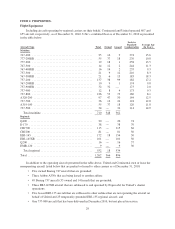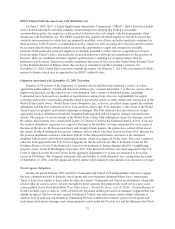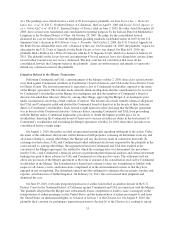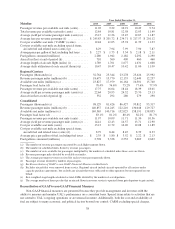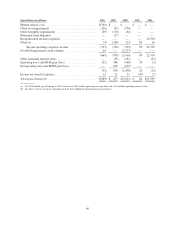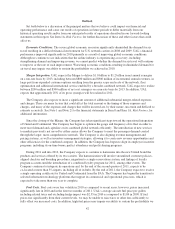United Airlines 2010 Annual Report Download - page 34
Download and view the complete annual report
Please find page 34 of the 2010 United Airlines annual report below. You can navigate through the pages in the report by either clicking on the pages listed below, or by using the keyword search tool below to find specific information within the annual report.EEOC Claim Under the Americans with Disabilities Act
On June 5, 2009, the U.S. Equal Employment Opportunity Commission (“EEOC”) filed a lawsuit on behalf
of five named individuals and other similarly situated employees alleging that United’s reasonable
accommodation policy for employees with medical restrictions does not comply with the requirements of the
Americans with Disabilities Act. The EEOC maintains that qualified disabled employees should be placed into
available open positions for which they are minimally qualified, even if there are better qualified candidates for
these positions. Under United’s accommodation policy, employees who are medically restricted and who cannot
be accommodated in their current position are given the opportunity to apply and compete for available
positions. If the medically restricted employee is similarly qualified to others who are competing for an open
position, under United’s policy, the medically restricted employee will be given a preference for the position. If,
however, there are candidates that have superior qualifications competing for an open position, then no
preference will be given. United successfully transferred the venue of the case to the United States Federal Court
for the Northern District of Illinois where the case law is currently favorable to United’s position. On
November 22, 2010, United filed a motion to dismiss the matter. On February 3, 2011, the court granted United’s
motion to dismiss which may be appealed by the EEOC within 60 days.
Litigation Associated with September 11, 2001 Terrorism
Families of 94 victims of the September 11 terrorist attacks filed lawsuits asserting a variety of claims
against the airline industry. United and American Airlines (the “aviation defendants”), as the two carriers whose
flights were hijacked, are the central focus of the litigation, but a variety of additional parties, including
Continental, have been sued on a number of legal theories ranging from collective responsibility for airport
screening and security systems that allegedly failed to prevent the attacks to faulty design and construction of the
World Trade Center towers. World Trade Center Properties, Inc., as lessee, also filed claims against the aviation
defendants and The Port Authority of New York and New Jersey (the “Port Authority”), the owner of the World
Trade Center for property and business interruption damages. The Port Authority has also filed cross-claims
against the aviation defendants in both the wrongful death litigation and for property damage sustained in the
attacks. The insurers of various tenants at the World Trade Center filed subrogation claims for damages as well.
By statute, these matters were consolidated in the U.S. District Court for the Southern District of New York and
the aviation defendants’ exposure was capped at the limit of the liability coverage maintained by each carrier at
the time of the attacks. In the personal injury and wrongful death matters, the parties have settled all but one of
the claims, in which settlement discussions continue, and for which a trial has been set in June 2011. Insurers for
the aviation defendants reached a settlement with all of the subrogated insurers and most of the uninsured
plaintiffs with property and business interruption claims, which was approved by the court. The court’s approval
order has been appealed to the U.S. Court of Appeals for the Second Circuit. The U.S. District Court for the
Southern District of New York dismissed a claim for environmental cleanup damages filed by a neighboring
property owner, Cedar & Washington Associates, LLC. This dismissal order has also been appealed to the U.S.
Court of Appeals for the Second Circuit. In the aggregate, September 11th claims are estimated to be well in
excess of $10 billion. The Company anticipates that any liability it could ultimately face arising from the events
of September 11, 2001 could be significant, but by statute will be limited to the amount of its insurance coverage.
Travel Agency Litigation
During the period between 1997 and 2001, Continental and United each independently reduced or capped
the base commissions paid to domestic travel agents and soon thereafter eliminated those base commissions.
These actions were similar to those taken by other air carriers. Continental and United are defendants, along with
several other air carriers, in two lawsuits brought by travel agencies that purportedly opted out of a prior class
action entitled Sarah Futch Hall d/b/a/ Travel Specialists v. United Air Lines, et al. (U.S.D.C., Eastern District of
North Carolina), filed on June 21, 2000, in which the defendant airlines prevailed on summary judgment that was
upheld on appeal. The two lawsuits against Continental, United, and other major carriers allege violations of
antitrust laws in reducing and ultimately eliminating the base commissions formerly paid to travel agents and
seek unspecified money damages and certain injunctive relief under the Clayton Act and the Sherman Anti-Trust
32


